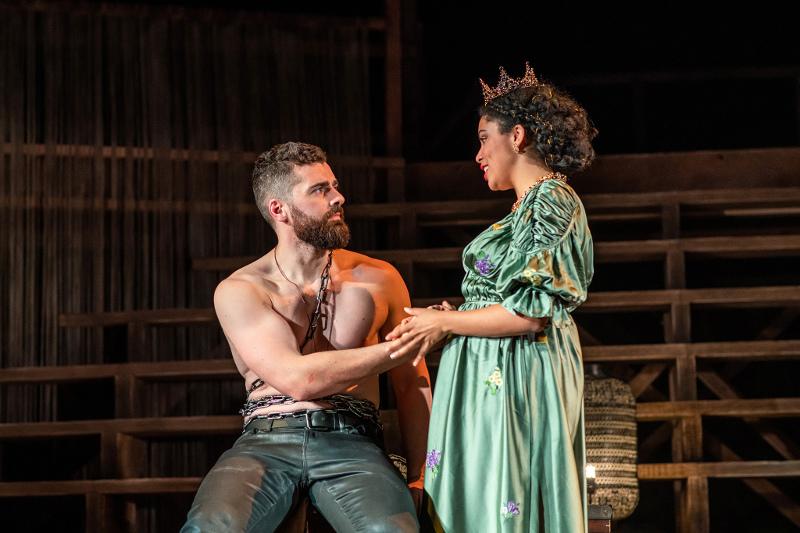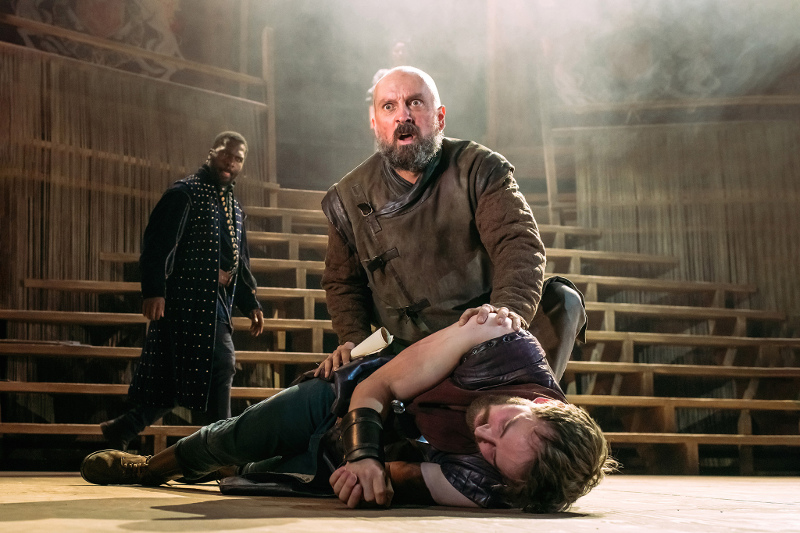James IV: Queen of the Fight, Festival Theatre, Edinburgh review - revelatory historical drama | reviews, news & interviews
James IV: Queen of the Fight, Festival Theatre, Edinburgh review - revelatory historical drama
James IV: Queen of the Fight, Festival Theatre, Edinburgh review - revelatory historical drama
Kingship, tolerance and the trappings of power are among the many themes of Rona Munro's passionate, timely new play

"The poem is real," intones entertainer-turned-courtier Ellen solemnly as a prologue and epilogue to Rona Munro’s vivid, vibrant new James IV: Queen of the Fight, presented by Scottish producers Raw Material and Edinburgh’s Capital Theatres in association with the National Theatre of Scotland, and getting its premiere at the city’s Festival Theatre before a Scotland-wide tour.
It’s the follow-up – and latest in a projected series of no fewer than seven historical plays (the sixth, Mary, opens soon at London’s Hampstead Theatre) – to Munro’s James Plays trilogy unveiled at the Edinburgh International Festival and London’s National Theatre in 2014.
And in many ways, that poem is what the play’s all about (spoiler on its way), a piece of scurrilous, racist invective by court makar William Dunbar aimed at belittling and humiliating two Black women brought against their will into the King’s court. The resonances to our own times are clear: Scotland might appear – and in many ways is – a welcoming, tolerant, outward-looking place, but scratch the surface, especially where power and reputations are at stake, and it can be just as bigoted and intolerant as anywhere else.
And, yes, the poem is real: Dunbar’s "Of Ane Blak-Moir" makes for decidedly uncomfortable listening in the 21st century. And, despite inevitable fictionalisations and bits of creative speculation, Munro’s tale is indeed rooted in historical fact – which, of course only makes it all the more surprising (if not downright shaming) that we’re so clueless about the two Black figures it describes in 16th century Scotland. Named Ellen and Anne by Munro, they’re first hijacked by pirates on the high seas, then delivered to the King as novelty performers, though they quickly prove canny in their dealings with court intrigues, ending up in the Queen’s service and the King’s bedchamber, with Ellen later serving as omnipotent judge (the play title’s Queen of the Fight) at one of the King’s showpiece brawls demonstrating his all-conquering might to English and French visitors. When the Queen senses a threat to her power, however, it’s clear those dangerous interlopers have to go. Indeed, there’s quite a profusion of themes jostling for our attention in James IV. Kingly power is high on the list, though Daniel Cahill as the monarch does a fine job of balancing strutting muscularity (quite literally at times) with a boyish neediness and perpetual worries about his reputation and lineage. Keith Fleming’s needling but nonetheless sympathetic Dunbar (pictured above with Thierry Mabonga as Peter and Ewan Black as Turnbull) holds forth on the perils of being a freelance writer (something Munro no doubt knows about better than many), and working to the whims of patrons. There’s an overarching friction, too, between performance and reality, in the roles that Ellen (a quietly commanding Danielle Jam) and Anne (a regal Laura Lovemore) are forced to assume at court to conceal their real relationship, and in the King’s ceaseless endeavours to play the role that others expect of him.
Indeed, there’s quite a profusion of themes jostling for our attention in James IV. Kingly power is high on the list, though Daniel Cahill as the monarch does a fine job of balancing strutting muscularity (quite literally at times) with a boyish neediness and perpetual worries about his reputation and lineage. Keith Fleming’s needling but nonetheless sympathetic Dunbar (pictured above with Thierry Mabonga as Peter and Ewan Black as Turnbull) holds forth on the perils of being a freelance writer (something Munro no doubt knows about better than many), and working to the whims of patrons. There’s an overarching friction, too, between performance and reality, in the roles that Ellen (a quietly commanding Danielle Jam) and Anne (a regal Laura Lovemore) are forced to assume at court to conceal their real relationship, and in the King’s ceaseless endeavours to play the role that others expect of him.
That last idea is nicely reflected in Jon Bausor’s impressive, arena-like set, all exposed wood and vertiginous steps, providing a strong focus for the production’s set pieces, not least the extravagant fight scene that ends part one. Director Laurie Sansom – who was also behind the earlier James Plays trilogy – captures Munro’s shifts between the epic and the intimate seamlessly in his passionate, eloquent staging, not least in playing up her unapologetically 21st century dialogue, which freely riffs between languages/dialects/accents, with some killer put-downs that wouldn’t be out of place on a Saturday night in Glasgow today.
James IV is hilarious and shocking, grand and even (occasionally) daringly mundane, and if it’s got a fault, it’s one of over-ambition. That said, Munro skips so nimbly between tones and ideas that you barely notice the expansive ground she’s managing to cover. In shining a bright new light – albeit a speculative one – on diversity in late medieval Scotland, it’s a revelation. More than that, though, it reminds us of some profound questions about tolerance and power that are very much still with us today.
- James IV: Queen of the Fight continues at Edinburgh’s Festival Theatre until Saturday 8 October, before a tour of Scotland that runs until 12 November
- More theatre reviews on theartsdesk
rating
Explore topics
Share this article
The future of Arts Journalism
You can stop theartsdesk.com closing!
We urgently need financing to survive. Our fundraising drive has thus far raised £49,000 but we need to reach £100,000 or we will be forced to close. Please contribute here: https://gofund.me/c3f6033d
And if you can forward this information to anyone who might assist, we’d be grateful.

Subscribe to theartsdesk.com
Thank you for continuing to read our work on theartsdesk.com. For unlimited access to every article in its entirety, including our archive of more than 15,000 pieces, we're asking for £5 per month or £40 per year. We feel it's a very good deal, and hope you do too.
To take a subscription now simply click here.
And if you're looking for that extra gift for a friend or family member, why not treat them to a theartsdesk.com gift subscription?
more Theatre
 Othello, Theatre Royal, Haymarket review - a surprising mix of stateliness and ironic humour
David Harewood and Toby Jones at odds
Othello, Theatre Royal, Haymarket review - a surprising mix of stateliness and ironic humour
David Harewood and Toby Jones at odds
 Macbeth, RSC, Stratford review - Glaswegian gangs and ghoulies prove gripping
Sam Heughan's Macbeth cannot quite find a home in a mobster pub
Macbeth, RSC, Stratford review - Glaswegian gangs and ghoulies prove gripping
Sam Heughan's Macbeth cannot quite find a home in a mobster pub
 The Line of Beauty, Almeida Theatre review - the 80s revisited in theatrically ravishing form
Alan Hollinghurst novel is cunningly filleted, very finely acted
The Line of Beauty, Almeida Theatre review - the 80s revisited in theatrically ravishing form
Alan Hollinghurst novel is cunningly filleted, very finely acted
 Wendy & Peter Pan, Barbican Theatre review - mixed bag of panto and comic play, turned up to 11
The RSC adaptation is aimed at children, though all will thrill to its spectacle
Wendy & Peter Pan, Barbican Theatre review - mixed bag of panto and comic play, turned up to 11
The RSC adaptation is aimed at children, though all will thrill to its spectacle
 Hedda, Orange Tree Theatre review - a monument reimagined, perhaps even improved
Scandinavian masterpiece transplanted into a London reeling from the ravages of war
Hedda, Orange Tree Theatre review - a monument reimagined, perhaps even improved
Scandinavian masterpiece transplanted into a London reeling from the ravages of war
 The Assembled Parties, Hampstead review - a rarity, a well-made play delivered straight
Witty but poignant tribute to the strength of family ties as all around disintegrates
The Assembled Parties, Hampstead review - a rarity, a well-made play delivered straight
Witty but poignant tribute to the strength of family ties as all around disintegrates
 Mary Page Marlowe, Old Vic review - a starry portrait of a splintered life
Tracy Letts's Off Broadway play makes a shimmeringly powerful London debut
Mary Page Marlowe, Old Vic review - a starry portrait of a splintered life
Tracy Letts's Off Broadway play makes a shimmeringly powerful London debut
 Little Brother, Soho Theatre review - light, bright but emotionally true
This Verity Bargate Award-winning dramedy is entertaining as well as thought provoking
Little Brother, Soho Theatre review - light, bright but emotionally true
This Verity Bargate Award-winning dramedy is entertaining as well as thought provoking
 The Unbelievers, Royal Court Theatre - grimly compelling, powerfully performed
Nick Payne's new play is amongst his best
The Unbelievers, Royal Court Theatre - grimly compelling, powerfully performed
Nick Payne's new play is amongst his best
 The Maids, Donmar Warehouse review - vibrant cast lost in a spectacular-looking fever dream
Kip Williams revises Genet, with little gained in the update except eye-popping visuals
The Maids, Donmar Warehouse review - vibrant cast lost in a spectacular-looking fever dream
Kip Williams revises Genet, with little gained in the update except eye-popping visuals
 Ragdoll, Jermyn Street Theatre review - compelling and emotionally truthful
Katherine Moar returns with a Patty Hearst-inspired follow up to her debut hit 'Farm Hall'
Ragdoll, Jermyn Street Theatre review - compelling and emotionally truthful
Katherine Moar returns with a Patty Hearst-inspired follow up to her debut hit 'Farm Hall'
 Troilus and Cressida, Globe Theatre review - a 'problem play' with added problems
Raucous and carnivalesque, but also ugly and incomprehensible
Troilus and Cressida, Globe Theatre review - a 'problem play' with added problems
Raucous and carnivalesque, but also ugly and incomprehensible

Add comment